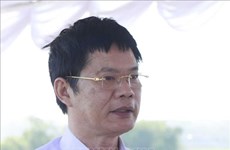Vietnam collects opinions for corruption evaluations
The Office of the Steering Committee for Anti-Corruption (OSCAC)
organised an international symposium in Hanoi on June 23 to garner
comments for the making of criteria to evaluate corruption and the fight
against the scourge.
The Office of the Steering Committee for Anti-Corruption (OSCAC)
organised an international symposium in Hanoi on June 23 to garner
comments for the making of criteria to evaluate corruption and the fight
against the scourge.
Addressing the symposium, OSCAC Head Vu Tien Chien affirmed that the Vietnamese Party and State have paid special attention to preventing and combating corruption, placing it high in their instruction and execution work.
Chien remarked the country’s declining position in the Transparency International’s corruption rating in three consecutive years from 2007, describing it an initial outcome the country has achieved in its fight against corruption, contributing practically to reducing economic decline, maintaining political stability and promoting socio-economic development.
Between 2007 and now, relevant Vietnamese agencies have initiated legal proceedings against 1,063 corrupt cases and brought 1,070 other similar cases into trial with 2,506 defendants.
OSCAC proposed that corruption and the fight against the menace should be evaluated on the grounds of five criteria, including the outcomes of public and press surveys, the results of the implementation of socio-economic development tasks, political stability and social order, and assessments by international organisations.
A representative from the Transparency International said international surveys are the most reliable tool to rate corruption situation in a single country.
Meanwhile, an official from the Republic of Korea Anti-Corruption Agency noted that the cause of corruption can only be identified when it is done in a roadmap with systematic and comprehensive approaches so corruption can be controlled effectively.
Talking with the press on the sidelines of the event, OSCAC Head Chien said those involved in corruption hold high positions and power and their actions are becoming more and more cunning so the fight against the scourge must be carried out with comprehensive measures and the involvement of the entire political system and society and prevention must be regarded a key task and corrupt behaviors must be punished severely.
He pointed to the need to employ subjective, comprehensive and scientific methods to evaluate corruption situation and anti-corruption results appropriately./.
Addressing the symposium, OSCAC Head Vu Tien Chien affirmed that the Vietnamese Party and State have paid special attention to preventing and combating corruption, placing it high in their instruction and execution work.
Chien remarked the country’s declining position in the Transparency International’s corruption rating in three consecutive years from 2007, describing it an initial outcome the country has achieved in its fight against corruption, contributing practically to reducing economic decline, maintaining political stability and promoting socio-economic development.
Between 2007 and now, relevant Vietnamese agencies have initiated legal proceedings against 1,063 corrupt cases and brought 1,070 other similar cases into trial with 2,506 defendants.
OSCAC proposed that corruption and the fight against the menace should be evaluated on the grounds of five criteria, including the outcomes of public and press surveys, the results of the implementation of socio-economic development tasks, political stability and social order, and assessments by international organisations.
A representative from the Transparency International said international surveys are the most reliable tool to rate corruption situation in a single country.
Meanwhile, an official from the Republic of Korea Anti-Corruption Agency noted that the cause of corruption can only be identified when it is done in a roadmap with systematic and comprehensive approaches so corruption can be controlled effectively.
Talking with the press on the sidelines of the event, OSCAC Head Chien said those involved in corruption hold high positions and power and their actions are becoming more and more cunning so the fight against the scourge must be carried out with comprehensive measures and the involvement of the entire political system and society and prevention must be regarded a key task and corrupt behaviors must be punished severely.
He pointed to the need to employ subjective, comprehensive and scientific methods to evaluate corruption situation and anti-corruption results appropriately./.













